
6 minute read
Columbia University School of Architecture, Planning and Preservation
COLUMBIA UNIVERSITY 1172 Amsterdam Avenue New York, NY 10027 212.854.3510 arch.columbia.edu
Amale Andraos, Dean
Student Faculty Ratio: 6:1 Tuition & Fees: $33,574.50/Semester US Students $33,684.50/Semester International Students
Number of Students: 783 Including Masters, PhD, and Non-degree students
Application Deadlines: 1/3 (MArch), 1/15
Type of Campus: Urban
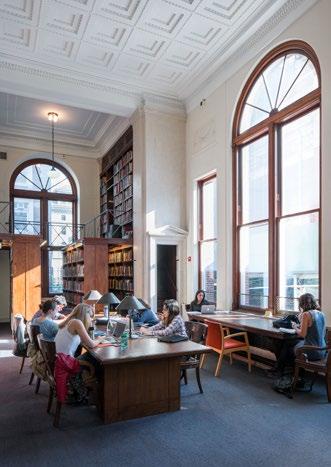
Avery Architectural & Fine Arts Library, Avery Hall. Photo by Ofer Wolberger.
Located in one of the most vibrant global cities, Columbia University’s Graduate School of Architecture, Planning and Preservation (Columbia GSAPP) is an urban condenser of ideas that fosters the diversity of perspectives, encounters, and backgrounds to re-imagine architecture and the built environment for the future. The school’s distinguished faculty includes some the world’s greatest thinkers, practitioners, and scholars leading the field of architecture, urban design and planning, historic preservation, and real estate development. Since its founding in 1881, Columbia GSAPP has led the constant change and re-invention of the disciplines and practices it holds, and critically considers architecture and the built environment in relation to broader historical and contemporary issues. The faculty and students collectively question what architecture should be, and recast the boundaries of the discipline so that graduates are prepared to address the urgent issues of our time. Columbia GSAPP’s engagement in New York and in various cities across the world offers students an unparalleled network of resources and exchange. In New York, the school’s rigorous programs, exhibitions, and publications make Columbia GSAPP an integral part of the city’s vibrant intellectual and artistic life. On campus, faculty-led academic research centers and experimental labs connect with other schools and institutes at Columbia to create a new context for understanding architecture and the future of cities, the environment, and technology. Columbia GSAPP cultivates an expanded culture of making that is simultaneously digital, material, and representational. The newly remodeled Making Studio enables a new culture of making that is imperative to individual expression and creativity as well as to critical thinking, assembling, and recycling. Alongside a 24-hour project space for large-scale mock-ups and experimentation, facilities include 3D printing, robotics and multi-modal making, rapid prototyping, and digital cutting and tooling. Columbia GSAPP has a long tradition of offering students extensive travel opportunities, studio trips, international summer workshops, and a global network through which new pedagogical models can be developed. This reflects an environment for testing ideas and engaging the expanded field of global contemporary practice, while addressing a range of contemporary issues affected by the built environment—such as climate change, sustainability, the evolving role of technology, and social equity.
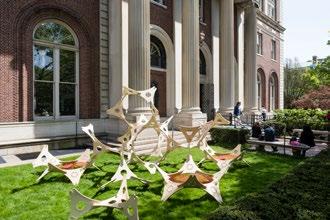
Brigette Borders, Peiyu Ding, Jichao Sun, Xingjian Shi, Yanchen Yu, Connie Jan, Caroline Jeon, and Lu Liu. Building Science and Technology course “Fast Pace/Slow Space” led by Mark Bearak and Brigette Borders, Spring 2018. Photo by James Ewing.
PROGRAMS
Columbia GSAPP offers seven master degree programs, eight joint-degree options, and three Ph.D. programs. Curriculum details and course listings can be found online: arch.columbia.edu/ programs
MASTER OF ARCHITECTURE
M.Arch is a three-year accredited professional program regularly ranked as one of the top architecture programs in the country. The program exposes students to architecture as a complex cultural endeavor through an engaged curriculum that spans a globalized History and Theory sequence to cutting-edge Visual Studies
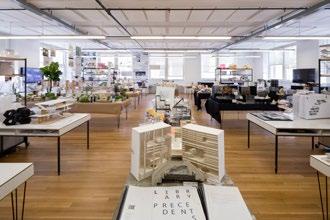
Architecture Studio during GSAPP’s End of Year Show, Spring 2018. Photo by James Ewing.
and Digital Technology, while focusing on central questions of housing, climate change, visualization, and scales of environment. Located above one of the world’s greatest architecture research libraries, the architecture studios are designed to reflect a pedagogical model of collaboration and exchange with individual work space supplemented by communal areas for group critiques and discussions among students and faculty.
M.S. IN ADVANCED
ARCHITECTURAL DESIGN M.S.AAD is a three-semester program that provides outstanding young professionals who already hold a B.Arch or M.Arch the opportunity to conceptualize design as a critical practice that shapes the world’s technological, relational, and environmental evolutions. A Core Studio during the first semester offers design studios and two required courses that establish the critical and historical coordinates for the program. In the remaining semesters, M.S.AAD students join third-year M.Arch students for the Advanced Studios and elective courses.
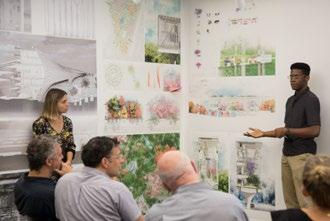
Lincoln Antonio, Marcela Rueda. Karla Rothstein AAD Studio Final Review, Summer 2018.
M.S. IN CRITICAL, CURATORIAL AND
CONCEPTUAL PRACTICES M.S.CCCP is a two-year program offering advanced training in the fields of architectural criticism, publishing, curating, exhibiting, writing, and research through intensive academic study and independent research. Students augment two required core colloquia and an independent thesis with elective lectures and seminars at GSAPP or elsewhere in the university.
M.S. IN ARCHITECTURE AND
URBAN DESIGN M.S.AUD is a threesemester program in the multidisciplinary study of cities, regions, infrastructures, and ecosystems. Summer Studio frames the five boroughs of New York City as a learning lab, examining biophysical infrastructures, conflicting public and private interests, and ongoing sociospatial change. Fall Studio considers the city-region, examining large-scale interdependencies and interactions. Spring Studio addresses global urbanization, extending previous work on physical and social infrastructures, programmatic interventions, and community partnerships.
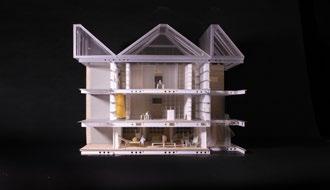
Yanisa Chumpolphaisal, Hilary Sample Advanced VI Studio, Spring 2018.
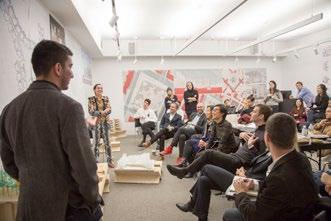
Hector Andres Garcia Cabeza, Luiza Furia. Eric Bunge Core III Final Review, Fall 2018.
M.S. IN URBAN PLANNING MS.UP is a two-year accredited professional program actively engaged in the practice of urban planning. The program offers four concentrations: Built Environment, Community and Economic Development, International Planning and Development, and Urban Analytics. The core of the first year studio is a team-based project and thesis is carried out throughout the second year.
M.S. IN HISTORIC PRESERVATION
M.S.HP is a multidisciplinary, two-year program geared towards the great challenge of protecting the world’s architectural, cultural, and historical heritage in the face of profound change. The program is structured around a sequence of three studios that culminate in a year-long independent research thesis.
M.S. IN REAL ESTATE DEVELOPMENT
M.S.RED is a three-semester program that combines the fundamental skills of professional real estate with a holistic approach to the urban environment. The first semester develops core competencies and the majority of classes are required, the second grants more space to focus on the development of specific industry interests, and the third consists mostly of deep-dive electives offered across GSAPP and the university.

Youngdae Song, Changjae Lee. Emmett Zeifman AAD Studio, Summer 2018.
PH.D. PROGRAMS Columbia’s Graduate School of Arts and Sciences (GSAS) administers doctoral level programs at GSAPP in architecture, historic preservation, and urban planning. NON-DEGREE PROGRAMS GSAPP offers two non-degree programs. Shape of Two Cities: New York-Paris is a one-year intensive liberal arts program that includes a studio component with a curriculum focused on design issues and the urban history and theory of these two cities. Introduction to Architecture is a 5-week-long immersive design studio, comprising studio and lecture formats, that presents a comprehensive experience in architectural design.

Ziqing Nie, Kutay Biberoglu. Steven Holl and Dimitra Tsachrelia Advanced VI Studio, Spring 2018.








